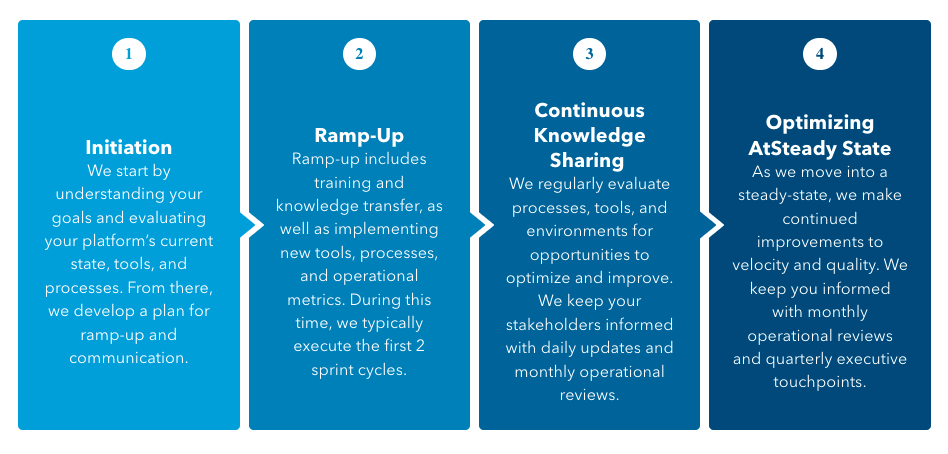Software Maintenance: Why It’s Important for Your Business
There’s a large amount of diligence that goes into developing robust modern-day technologies—from creating an infrastructure plan to organizing an engineering team to collecting resources, project managing, and everything else in between.
Once a business finally delivers a high-quality product in today’s demanding market, it’s nothing short of exciting… but what happens next? The software life cycle doesn’t become stagnant once your product goes live. This is where proactive software maintenance comes in.
Just as a car needs occasional fine-tuning and a thorough inspection every year, software systems need continuous maintenance and support services to be successful. These services help identify bug fixes and mitigate the potential risk of software deterioration and product unresponsiveness in the future.
Sure, companies can focus on QA and automated testing before you deliver your product to the market, but what happens if things change within your product while it’s on the market?
Ongoing monitoring of your software is essential and we’re here to outline why businesses need a maintenance plan—or partner—in place for the new year.
What is Software Maintenance?
Software maintenance is the process of updating and adjusting the functionality of an existing software product (after its delivery) in order to optimize existing features, install new ones, or address any necessary errors in the system.
Through preventive maintenance and continuous monitoring, businesses can improve software performance and deliver a faultless application to their users, leading to increased customer loyalty and a strong foundation for future product releases.
Listen to more insight from Jeff Scott, VP of Software Services at KMS, as he shares the importance of continued software maintenance below.
Why Companies Implement Ongoing Software Monitoring
Your tire pressure light comes on in your car— do you fix it immediately or procrastinate until you get a flat tire on the side of the road?
In order to keep up with a competitive software landscape, businesses need to catch and correct faults in their products way ahead of time, especially before minor bugs become substantial.
Although bug-catching ideally happens in the QA testing phase, errors that didn’t previously exist can pop up when one part of the software changes, updates, or fails, which means that even a flawless QA system doesn’t guarantee a sustainably flawless product.
A few immediate benefits of ongoing software maintenance include:
- Fine-tuned and improved software performance
- Minimized technical debt
- Reduced system unpredictability
- Software stability
- Boosted customer satisfaction and retention
- Instilled confidence in your team knowing they have an error-free product
- Freed up internal resources when you work with a partner
Overall, more and more companies are prioritizing ongoing software support and monitoring because they understand the long-term value. Consistent maintenance of products drives more efficiency and can fuel a manageable means of creating an optimal user experience, which could end up paying for itself in both performance improvement and customer retention.
Different Types of Software Maintenance
The key to a streamlined maintenance process is understanding the techniques your team needs to implement for each category, along with which tools to adopt for maximum efficiency.
There are four different maintenance categories:
|
4 Types of Software Maintenance |
Description |
| Corrective Maintenance | Corrective software maintenance addresses issues that impact the widespread operational aspect of your product, like software design, user experience, code, etc. This is the most standard form of maintenance and typically includes bug fixes and repairing error messages. |
| Preventive Maintenance | Preventive software maintenance optimizes your product for future use and scalability. As your software runs and performs, this type of maintenance allows you to detect and repair smaller issues as they come—so they don’t turn into bigger issues down the road. |
| Perfective Maintenance | Perfective software maintenance is the process of adjusting software as necessary in order to adapt to the market and the customer’s changing needs. Once an application is live, users may share feedback on how to maximize product efficiency—whether that’s installing new features or fixing existing performance. |
| Adaptive Maintenance | We all experience the moment you have to reboot your computer after an update. Treat your software the same way. Adaptive software maintenance allows your product to accommodate any new operational changes that are installed so the system continues to run seamlessly. |
You may need one category of software maintenance or a combination to elevate your product. If you don’t know where to start or are lacking internal resources to commit to sustainable software maintenance, an experienced partner can help.
The KMS Maintenance Process
At KMS, we understand the importance of adopting a distinguished software support plan after deployment.
Here’s a peek into a few important steps in the KMS software maintenance services approach:

Along with full-cycle software services and leading offshore development and software engineering teams, KMS has the expertise to guide you through custom support plans and ongoing maintenance services that help sustain software operability.
We have multiple ways we can work with you, including:
- Building your software product for you and doing everything in between, including ongoing maintenance
- Taking over maintenance support of your existing legacy software (quality assurance services, software testing, etc.)
- Partnering you with our Asia-pacific team of top software developers that provide your business with global coverage from initial concept to launch
Want to know more about how the KMS team can build and launch a maintenance strategy for your business?







